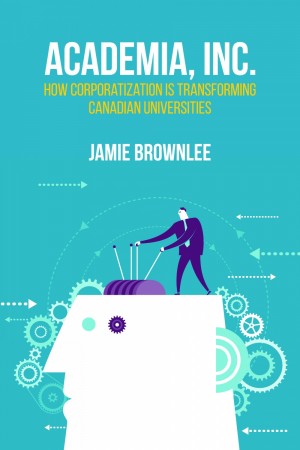Chip in to keep stories like these coming.
Although anyone in close proximity to post-secondary education already knows it in their bones, there has been not nearly enough ink spilled on the ongoing corporatization of the university. Jamie Brownlee offers one of the most complete accounts of that process with Academia, Inc.: How Corporatization Is Transforming Canadian Universities.
It’s a much-needed contribution. There are few comprehensive books that specifically address corporate influence in Canadian universities. Two recent efforts include Howard Woodhouse’s Selling Out, which focuses more on academic freedom; and Henry Giroux’s excellent Neoliberalism’s War on Higher Education, which is North American in focus.
Brownlee is careful to distinguish between the increased presence of corporations on campuses, like more Coke machines and Manchu Woks in cafeterias, and corporatization as a process through which the university evolves “to better serve the private marketplace.” Corporatization isn’t privatization, it’s the “transformative” practice through which “the uses and benefits of university resources and knowledge production are being handed over to private interests at the public’s expense.”
Brownlee counts four separate strands in this transformation: teaching and academic labour; student life and learning; institutional governance; and university research.
His prose is citation heavy and at times reads like the doctoral dissertation it is. But while there may not be much new here for any who have felt the squeeze of neoliberalism on the academy, his methodological approach leaves little doubt as to the scale and scope of corporate influence in Canadian universities.
He tracks the shift of students’ priorities from personal development towards landing a well-paying job; from a diploma representing intellectual growth and expertise to a “purchasable commodity” that now indebts students to penurious degrees.
Brownlee also describes the transformation of the democratic, unionized university workplace of the 1960s and 1970s to an institution managed like a business. He documents the emergence of corporate practices like CEO salaries for school presidents, business interests on governing boards and ballooning administrative sectors.
The standout section of Academia, Inc., however, is the chapter on the casualization of academic labour and the sharp increase in universities’ reliance on contract faculty. Brownlee’s research into numbers of part-time contract academic faculty is impressive and to my knowledge unprecedented.
Through a number of FOI requests he compiles statistics from almost all of Ontario’s universities on sessionals and adjuncts in the social sciences and humanities. I haven’t seen data like this all in one place before.
His numbers are astonishing. At Carleton, one out of every five courses was taught by part-time faculty in 2003; by 2011, that number was one in three. Part-time contract appointments in the humanities and social sciences increased at York by 136 per cent from 2000 to 2010, including a gobsmacking 564 per cent in the English department. At Trent, part-time positions increased by 203 per cent; at the University of Toronto, 235 per cent.
The rates are consistent across all his data. In 2001, tenure-tracked appointments outnumbered contract faculty by one-quarter. By 2010, there was more part-time faculty than tenure-tracked. And the differences in salary, benefits, hours and job satisfaction are stark. “In no other occupation,” Brownlee writes, “is there such a wide disparity between groups whose jobs and training are so similar.”
While the book makes a strong case, and there is little doubt as to where Brownlee’s politics lie, the bulk of it is noticeably non-polemical. This strategy at times buttresses Brownlee’s sober indexing of various federal and provincial policies and corporate interventions in the post-secondary-sphere, allowing his research to shine — but Academia, Inc. palpably lacks the dazzling, imaginative edge that so dominates, for example, Henry Giroux’s work on the subject.
Brownlee opens the book with a chronicle of the sweeping, explosive and courageous student movements that have punctuated the last five years of neoliberalism’s ascendancy in the academy. It is as if he tries to draw energy from these popular protests to make up for the temperance of the subsequent 180 pages. But these are not temperate subjects: these are urgent, heated shouts that demand more than stocktaking.
This is not to criticize Brownlee for not being Henry Giroux. It is extremely valuable to have an enunciation of the history of neoliberalism in the Canadian academy. But it is not enough merely to document the plight of a generation of young people who have been bamboozled into seeking a future through higher education only to see that promise dissolve before their eyes in a sea of debt, precarity and loss.
Academia, Inc. takes the temperature of an academic workforce on the brink; but we need more than a thermometer to pull them back.
Michael Stewart is the blogs coordinator for rabble.ca. Follow him on twitter: @m_r_stewart.



